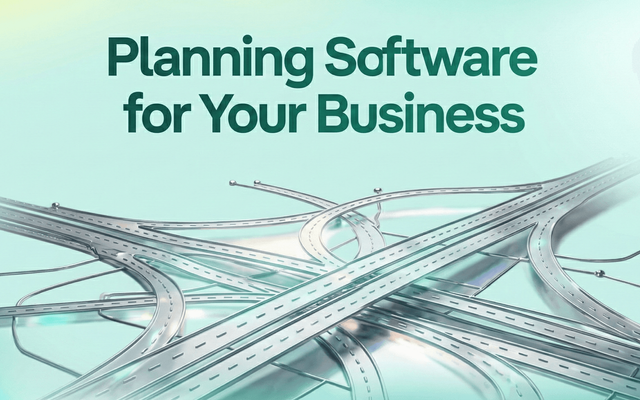
Growth is good. Chaos? Not so much — but necessary. Chaos is the sort of thing that seeps in and has to be addressed. Entropy is a natural force. Without mincing words, every business wants to scale. But, they do so without a game plan — and in many cases, they have uncontrollable scaling. It's sort of like an out-of-control cellular growth that turns into a tumor.
That’s why, in most cases, they need to think ahead. think it through. And have outside help before they make the leap. They need infrastructure and ideas for that scaling. They can’t do it by “winging” it. So, let’s dig in and take a look at why software development - in that critical step - is one of the most important for a successful beachhead into new territories and objectives.
Just Give Us More
More customers. More revenue. More market dominance. Those are just some of the reasons to pump some radioactive juice into your scaling plan. Why, in a nutshell, do you even play with the idea of scaling in the first place?
But here’s what they don’t tell you: if your systems can’t handle the pressure, scaling isn’t growth—it's a cancerous thing fermenting that will, sooner rather than later, go critical and land you in the ICU.
Operations jam up. Teams waste hours on manual processes. Data gets scattered across 15 different tools that barely talk to each other. Customers notice the cracks before you do.
Let’s talk of data for a minute — just that pillar. Scaling means onboarding new people, which, in turn, means greasing communication channels. Which in turn means adopting new apps. But some folks send emails, others text messages, others WhatsApp, some go on Slack, others on Trello, and that’s just the tip of the iceberg. How do you handle that? How do you create a system that you know will work? One where data flows through the same stream as well as communication?
This is why enterprise software development is a critical phase of all burgeoning operations — and, in essence, separates winners from companies choking on their own success.
Because if you’re serious about scaling, you don’t need another generic SaaS tool. You need custom, enterprise-grade software that’s built to handle high-volume operations, data-heavy decision-making, and ruthless efficiency.
Let’s break it down.

What Is Enterprise Software Development—and Why Should You Care?
Enterprise software development is exactly what it sounds like: building large-scale, custom-tailored software solutions that don’t just fit your business—they become the engine that drives it.
Forget off-the-shelf software that forces you into one-size-fits-all processes. Enterprise software is designed to:
Eliminate bottlenecks before they stall your growth
Automate repetitive tasks so your team stops wasting time
Centralize data so decisions are based on facts, not guesswork
Scale without breaking—because the last thing you need is your tech failing right when demand spikes
Scaling Is More Than Just Hiring More People
A lot of companies think scaling means throwing more people at the problem—more employees, more managers, more middlemen.
Wrong.
Growth without systems that scale is just growth gone wrong or about to go wrong. The real way to scale is to make your processes smarter. To make them faster. And, ultimately, to automate them.
That’s why companies invest in enterprise software development—because manual work doesn’t scale properly. For example, one of our clients - a tour company in the US - decided to incorporate new cities into its services. It scaled up from 20 cities to 73. Their approach is to create the websites and then work from there.
What happened? They started to need more personal attention. Not just guides in each city but writers for the blogs of each city, social media managers, madmen, branding specialists, accountants, and dozens more. They were in a pinch and needed it fast — why? They were already selling tickets to their tours. So they just started hiring. One day, they have a company-wide Zoom meeting — over 120 people on it. Of those 120, only 4 were actually participating.
They had redundancies, they had 20 people sitting in for projects that only needed one — and all of them were cashing a monthly paycheck. They had become so bloated that they simply couldn’t do anything. They needed to contact 30 people for stock photos (why? Because they had hired that amount just for media creation). Do you know how hard it is for 30 people to agree on what photo to use? And that was just one of a thousand anecdotes.
How Enterprise Software Fuels Business Scalability
Scaling a business isn’t about working harder —It’s about working smarter. It’s about working less, but in that time being more focused and driven.
Built for Complexity, Designed for Growth
The problem with off-the-shelf solutions? They break down the second your operations become more complex than they were designed for.
Enterprise-level software development builds systems that handle:
Massive transaction volumes without slowing down
Seamless integration with your existing tools and databases
Custom workflows tailored to your business—not some SaaS vendor’s idea of what you need
Common Types of Enterprise Software
Enterprise software isn’t just one thing—it’s an arsenal of tools that work together to streamline every part of your business.
ERP (Enterprise Resource Planning): Unifies finance, HR, inventory, and supply chain data into a single system.
CRM (Customer Relationship Management): Tracks every customer interaction and powers data-driven sales & marketing.
BI Tools (Business Intelligence): Turns raw data into real-time insights—so decisions aren’t based on gut feelings.
Workflow Automation Systems: Eliminates manual approvals, redundant tasks, and bottlenecks across departments.
Companies using enterprise software development services see a 30% increase in operational efficiency—just from cutting out wasted time and duplicated effort.

The Unmatched Benefits of Enterprise Software Development
Enterprise software isn’t just about keeping up. It’s about leading.
Customization & Flexibility
Your business isn’t generic. Your software shouldn’t be either. Custom-built enterprise software adapts to your exact needs, not the other way around.
Integration Capabilities
Disconnected software tools waste hours and cause mistakes. Enterprise software integrates everything, so data flows seamlessly across departments—from sales to finance to supply chain.
Automation & Efficiency
Every minute spent on manual data entry, approvals, or repetitive tasks is a minute stolen from innovation and growth. Automated workflows eliminate human error and free up employees for high-value work.
Data-Driven Decision Making
Gut instinct isn’t a strategy. Enterprise software gives real-time analytics, predictive insights, and machine-learning-powered forecasting—so every move is backed by data.
Security & Compliance
Growth means handling more data, more customers, and more risk. Enterprise software comes loaded with advanced security, ensuring compliance with industry standards and keeping your business protected.
When Should You Invest in Enterprise Software Development?
If you’re still manually patching together processes, waiting on slow approvals, or dealing with disconnected systems, the answer is yesterday.
Businesses invest in enterprise software development when:
Manual processes slow down operations
Departments are working in silos instead of a connected system
Data is scattered across tools that don’t communicate
Security risks increase as operations scale
If this sounds like your company you’re already overdue for a tune-up.
The 4 Key Phases of Enterprise Software Development
Phase 1: Product Discovery & Planning
Before building anything, businesses need a strategy. A Product Discovery Workshop maps out goals, technical needs, and long-term scalability. Check out our Product Discovery Workshop to see how it aligns software vision with business growth.
Phase 2: System Architecture & Design
Choosing the right technology stack means the difference between scalability and expensive breakdowns down the road. Enterprise software is built for long-term expansion.
Phase 3: Agile Development & Testing
Enterprise software isn’t built in one giant launch—it’s developed in iterations, with testing at every step. This ensures flexibility, security, and a product that actually works.
Phase 4: Deployment & Continuous Maintenance
Once deployed, software evolves with your business. Ongoing updates, security patches, and performance monitoring keep your systems future-proof.
Scale Smarter or Fall Behind—Your Choice
Growth without the right systems isn’t just messy—it’s a disaster waiting to happen. Without the right infrastructure, businesses get bogged down in inefficiencies, miscommunication, and chaos.
The ones that don’t get it? They’ll drown while others speed past them. Off-the-shelf software won’t cut it.
If you’re serious about scaling, you need enterprise-grade solutions—custom-built, future-ready, and designed to grow with you, not against you.







